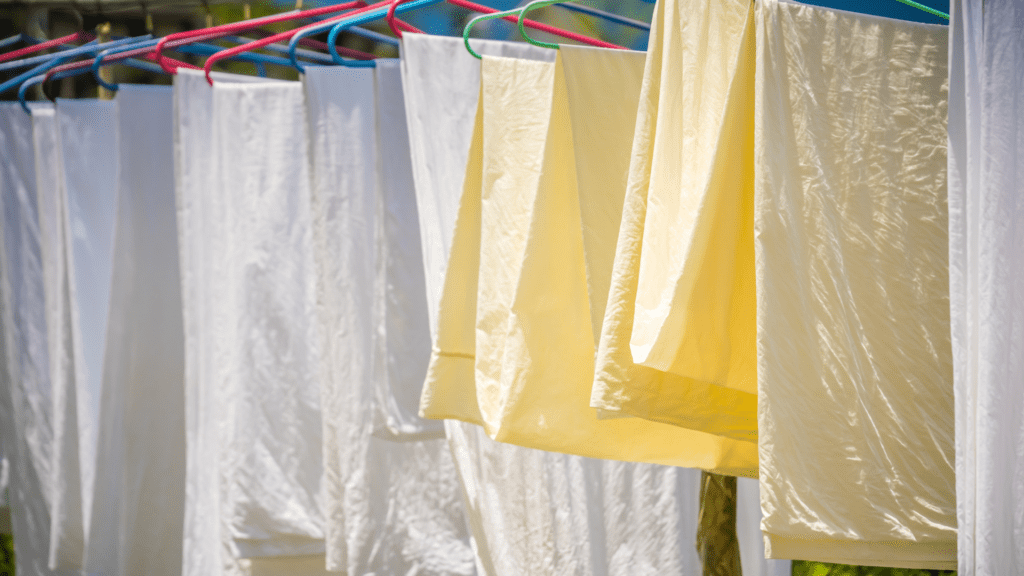A lot of people think that washing bed sheets is as simple as tossing them into the washing machine, hitting any cycle, and hoping for the best. But that’s not the best approach! Knowing how to wash sheets properly can significantly impact their lifespan and your health. Since you sleep on your sheets every night, keeping them clean and fresh is essential for your comfort and well-being. Let’s dive into how you can do it the right way!

Washing bed sheets may seem like a no-brainer, but many people overlook some basic steps that make all the difference. Whether you’re wondering “What setting should I wash sheets on?” or “Can you wash sheets and blankets together?”, this guide has got you covered. By the end, you’ll know exactly how to wash bed sheets in the washing machine and keep them feeling fresh and new for longer. Plus, I’ll tackle some myths about washing sheets, like whether bed sheets are delicate and how often you should be washing them.
Preparing Your Sheets for Washing
Before you throw your sheets into the washing machine, it’s important to take a few simple steps to prep them. This small effort can make a huge difference in how clean and fresh they turn out. Plus, it helps avoid any unexpected damage to your bedding.
Check the Care Label
You might be tempted to skip reading the care label but trust me, it’s worth the glance. Different fabrics require different care. For example, cotton sheets can handle a hotter wash, while satin or silk sheets need something gentler. So, what setting should you wash sheets on? The answer lies in the label! Make sure to adjust the temperature and cycle accordingly based on what your sheets are made of.
Also, the care label may give you tips on whether you should avoid using certain detergents, like those with bleach, which can wear down the fabric faster. If you’re asking, “Are sheets delicates?”, the care label will tell you if that’s the case!
Pre-Treat Any Stains
Got a stain on your sheets? Don’t ignore it! Pre-treating stains is one of the best ways to keep your sheets looking like new. Sweat, body oils, or even makeup stains can get stuck in the fabric, making them harder to remove if left untreated. Before tossing the sheets in the wash, grab a stain remover and apply it to any spots that need a little extra love.
Wondering how to clean bed sheets that have stubborn stains? Use a gentle but effective stain remover, let it sit for a few minutes, and then wash as usual. This quick pre-treatment step will help prevent stains from setting in permanently.
Should You Wash Sheets Separately from Other Laundry?
This is a common question: can you wash sheets with clothes? While it might seem like a time-saver to throw everything together, it’s better to wash sheets on their own. Washing bed sheets with clothes can lead to uneven cleaning and even fabric damage. Clothes can get tangled in the sheets, causing them to stretch or tear. Plus, your sheets need plenty of room to move around in the washing machine for a thorough cleaning.

How to Wash Goose Down Pillows to Get a Fresh and Fluffy Sleep is another important question for maintaining a clean bed. When it comes to washing other bedding items, you might wonder, “Can I wash blankets with sheets?” Generally, the answer is yes, but there are a few caveats. Make sure the load isn’t too heavy or stuffed, as this can affect how clean everything gets. Washing sheets and blankets together is fine as long as you don’t overpack the machine and follow the recommended settings on the care labels. For goose-down pillows, use a gentle cycle with mild detergent and ensure they are thoroughly dried to keep them fluffy and fresh.
Step-by-step guide on How to Wash Sheets
Now that your sheets are prepped, it’s time to wash them. You want to get this part right to keep your sheets soft, fresh, and long-lasting.
What Temperature to Wash Sheets: Hot, Warm, or Cold?
One of the most important decisions you’ll make is what temperature to wash your sheets at. The temperature you choose depends on the fabric, but generally, washing in warm water strikes the perfect balance between cleaning power and fabric care.
- Washing sheets in hot water can kill dust mites and bacteria, which is great if someone in your home suffers from allergies or if the sheets are heavily soiled.
- Washing sheets in cold water can help protect colors and fabric, but it may not remove as many germs or stains.
So, what washing machine setting for bed sheets is best? For most people, a warm wash is ideal unless your sheets have specific needs.
Best Washing Cycle for Sheets: Delicate vs. Normal
You might wonder if bed sheets are delicate and need to be washed on a gentle cycle. For most fabrics like cotton, a regular cycle is perfectly fine. However, for more delicate fabrics like silk or linen, it’s best to stick with a gentle or delicate cycle to prevent wear and tear.
The best advice is to refer to the care label again to determine the cycle. And if you’re ever unsure, going for a mild wash setting can never hurt.
Can You Wash Sheets in Cold Water?
Many people prefer washing sheets in cold water to save energy and prevent shrinkage. But, can you wash sheets in cold water and still get them clean? Yes! While cold water might not be as effective at killing germs, it’s gentle on fabric and can still remove dirt, especially if you pre-treated any stains beforehand.
Washing Sheets with Vinegar for Extra Freshness
If you’re looking for an extra boost of freshness, try washing sheets with vinegar. Adding half a cup of white vinegar to the rinse cycle helps break down detergent residue and softens the fabric naturally. It’s a simple trick that makes your sheets feel cleaner and smell fresher, without the need for fabric softeners.
Step-by-Step Guide on How to Wash Sheets
Most people think that all you need to do is toss your sheets in the washing machine, hit start, and let the magic happen. But, it’s not that simple! If you want your bed sheets to last and stay in great condition, you need to pay attention to a few key steps. Let’s dive deeper into the specifics.
What Temperature to Wash Sheets: Hot, Warm, or Cold?
Many believe that washing sheets in hot water is the only way to ensure they’re clean. But, that’s not always true. The ideal temperature for washing your sheets depends on the fabric. While washing bed sheets in hot water is effective for killing germs and removing dirt, it can also cause your sheets to wear out faster, especially delicate materials like linen or bamboo.

So, what’s the best option? Here’s a simple breakdown:
Hot Water
Ideal for white cotton sheets or when you need to disinfect your bedding. It kills dust mites, removes allergens, and works well if you want a deep clean. But keep in mind, that hot water can shrink and fade colors over time.
Warm Water
The perfect middle ground for most types of bed sheets. It cleans well without causing as much wear and tear as hot water. It’s especially good for materials like polyester and microfiber.
Cold Water
Great for protecting delicate fabrics and preventing shrinkage. Washing sheets in cold water also saves energy, but it may not remove heavy stains or kill germs as effectively. Cold water works best for lightly soiled sheets or fabrics that can’t handle heat.
So, whether you’re asking “What temperature do you wash bed sheets on?” or “Can I wash sheets in cold water?”, it’s all about balancing the needs of your fabric with the level of cleanliness you want.
Best Washing Cycle for Sheets: Delicate vs. Normal
Another misconception is that sheets need to be washed on a delicate cycle. The truth is most sheets, especially cotton, do just fine on a normal cycle. Washing bed sheets on a normal cycle helps to shake loose dirt, oils, and other debris that can get trapped in the fabric. The vigorous movement helps ensure that the sheets come out fresh and clean.
However, when dealing with delicate fabrics like silk or linen, it’s smart to opt for a gentle or delicate cycle. This prevents unnecessary friction and wear, which can damage the fibers.
For most of us with standard cotton or polyester sheets, sticking with a normal wash cycle is the best way to go. But if you’re using more luxurious fabrics, it’s worth considering the gentle cycle for added care.
Can You Wash Sheets in Cold Water?
There’s a common belief that washing sheets in cold water just won’t get them clean. But, that’s not necessarily the case. Can you wash sheets in cold water and still remove dirt and stains? Yes! Cold water can still clean effectively when paired with the right detergent. If your sheets aren’t heavily soiled, or if you’ve pre-treated any stains, cold water is perfectly fine.
Using cold water not only helps preserve the color and fabric of your sheets, but it’s also more energy efficient. It’s a win-win for both your bedding and the environment. However, if you’re dealing with allergies, or if you’re concerned about germs and dust mites, you may want to consider a warmer temperature for extra cleanliness.
Washing Sheets with Vinegar for Extra Freshness
If you want to keep your sheets extra fresh, washing bed sheets with vinegar is a simple but effective trick. Adding half a cup of white vinegar to your rinse cycle works wonders for breaking down detergent residue, softening the fabric, and keeping your sheets smelling clean.
The acidity of vinegar helps remove the leftover soap that often gets trapped in fabrics, making your sheets feel softer without the need for chemical fabric softeners. Plus, vinegar is a natural deodorizer, so your sheets come out smelling fresh without any artificial fragrances.
Don’t worry—your sheets won’t smell like vinegar once they’re dry! It’s an easy, affordable way to boost the quality of your laundry routine.
How to Dry Sheets for Best Results
Many people think that drying sheets is as simple as throwing them in the dryer. But believe it or not, the way you dry your sheets plays a big role in how they feel and how long they last. Here’s how to do it the right way.

Should You Use a Dryer for Sheets? Pros and Cons
The most common way to dry sheets is by using a dryer, and for good reason. It’s fast and convenient. However, it’s important to recognize that using a dryer for sheets does come with some trade-offs.
Pros of Using a Dryer
Using a dryer saves time and energy by quickly drying your sheets, leaving them soft and ready for use. It also helps eliminate dust mites and allergens with its high heat settings.
Speed
Your sheets will be dry and ready to use in a short amount of time.
Softness
The heat and tumbling action can fluff your sheets, making them feel soft and cozy.
Cons of Using a Dryer
Using a dryer can wear out your sheets faster, causing the fabric to thin or shrink over time. It also consumes more energy, leading to higher electricity bills and a larger environmental footprint.
Wear and Tear
High heat can break down fabric fibers over time, causing your sheets to become thinner and rougher.
Shrinkage
Certain fabrics, like cotton, can shrink when exposed to high dryer temperatures.
If you choose to use a dryer, try using a lower heat setting to minimize wear and tear. This helps prevent shrinkage and keeps your sheets feeling softer for longer.
How to Dry Sheets Without Shrinking Them
One of the most common concerns when drying sheets is shrinkage. No one wants to pull their sheets out of the dryer only to find they’ve become too small for the bed! So, how do you dry sheets without shrinking them?
The key is to use low heat. High temperatures are the main cause of fabric shrinkage, especially with cotton and other natural fibers. Set your dryer to a low heat or “delicate” cycle to dry your sheets gently without risking shrinkage.
Another tip is to remove the sheets from the dryer while they’re still slightly damp. This not only prevents over-drying (which can lead to shrinkage) but also makes them easier to iron or smooth out if needed.
Tips for Air-Drying Sheets and Avoiding Wrinkles
If you want to skip the dryer altogether, air-drying your sheets is an excellent option. Air-drying sheets help preserve the fabric’s integrity and prevent shrinkage. Plus, if done right, it can leave your sheets smelling wonderfully fresh.
To avoid wrinkles while air-drying, hang your sheets as straight as possible. Use clothespins to secure the corners and let them dry in the open air. If you have the space, line-drying outside works best, as the breeze helps minimize wrinkles.
If you need to dry your sheets indoors, try laying them flat or draping them over a drying rack. The key is to ensure they are spread out to prevent creasing. If you do end up with wrinkles, a quick steam or iron will have your sheets looking smooth and crisp again in no time.
How Often Should You Wash Sheets?
A common belief is that you only need to wash your sheets when they start to look dirty or smell bad. However, this is far from the truth. How often you wash sheets depends on various factors like your lifestyle, allergies, and personal hygiene, but the recommendation might surprise you.
General Recommendations for Washing Frequency
Most experts agree that washing your sheets once a week is ideal. The reason is simple: over time, your sheets accumulate dirt, sweat, dead skin cells, and even bacteria. If you’re sleeping on these surfaces night after night, they can affect your skin and health. For people with allergies or sensitive skin, washing bed sheets more frequently, such as every three to four days may be necessary to reduce dust mites and allergens.
If weekly washes seem too much, consider doing it at least every two weeks. You’ll still be keeping your bed clean, and you can extend the lifespan of your sheets by avoiding overwashing. Ultimately, the best way to wash sheets is to find a balance that works for you, while also maintaining good hygiene.
Factors That Might Require More Frequent Washing
Certain circumstances call for washing sheets more often than the typical once-a-week routine. Here are some scenarios where you might want to up your washing game:
Allergies
If you suffer from allergies, especially to dust mites or pollen, frequent washes can help reduce allergens in your bedding. Washing bedding more often can significantly improve your sleep quality and reduce allergy symptoms.
Night Sweats
If you sweat a lot during sleep or live in a hot climate, you may need to wash your sheets more frequently. Sweat can cause your sheets to become damp, creating an environment where bacteria can thrive.
Pets on the Bed
Love snuggling with your furry friends? If your pets sleep with you, it’s essential to wash your sheets more often to remove hair, dander, and dirt they might bring in from outside.
Illness
After recovering from an illness, it’s a good idea to wash your sheets right away to remove any lingering germs and bacteria.
By recognizing these factors, you can adjust how often you wash your sheets to ensure you’re sleeping in a clean, healthy environment. Whether you’re asking “How often should I wash my sheets?” or “How do I wash bed sheets regularly without damaging them?”, it’s all about staying consistent while caring for the fabric.
Best Practices for Keeping Sheets Fresh Between Washes
Keeping sheets fresh between washes can feel like a challenge, especially if you tend to sweat during the night or have pets sharing your bed. But with a few simple tricks, you can maintain clean bedding longer and still enjoy a fresh sleep environment. Here’s how:

Air Out Your Bed Daily
One easy way to keep your sheets fresh is to air out your bed each morning. Instead of making your bed right away, pull back the blankets and allow your sheets to breathe. This helps release trapped moisture and reduces the chance of bacteria and odors building up. Clean bedding isn’t just about regular washing—it’s also about allowing your sheets to dry and stay fresh between cleans.
Letting the air circulate in your bedroom by keeping windows open for a while can also help keep your bedding smelling clean longer. The fresh air removes any musty smells, keeping your bed environment more pleasant.
Use a Linen Spray
A quick spritz of linen spray can do wonders for keeping your sheets smelling fresh between washes. Washing sheets in the washing machine is effective, but to maintain that fresh scent, try using a natural linen spray made with essential oils like lavender or eucalyptus. Not only will this add a pleasant fragrance, but some essential oils can also have antibacterial properties, helping to keep germs at bay.
Make sure to choose linen sprays that are free from harsh chemicals or synthetic fragrances, as these can irritate sensitive skin.
Rotate Your Sheets
Another simple tip to extend the freshness of your sheets is to have more than one set in rotation. By switching out your sheets regularly, you reduce wear and tear on a single set and allow one set to “rest” while the other is in use. This also gives you more time between washes since you’re not using the same sheets night after night.
Rotating your sheets is especially useful if you’re asking, “Can I wash sheets and blankets together?” You’ll always have a fresh set on hand while the other is in the wash.
Keep Pets Off the Bed
As much as we love our pets, they can contribute to bedding getting dirty faster. Pet hair, dander, and even the dirt they carry on their paws can get trapped in your sheets, making them feel less fresh between washes. If you want to keep your sheets cleaner longer, try setting up a cozy spot for your pet near the bed instead of letting them sleep with you.
Of course, if keeping pets off the bed isn’t an option, you might want to wash your sheets more frequently or at least give them a good shake each day to remove pet hair and debris.


